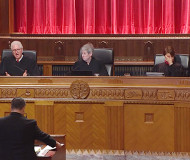4/26/2018
Ohio Supreme Court Skeptical Over Municipal Speed Camera SuitOral arguments in Ohio Supreme Court speed camera case could open door to funding limitation legislation against photo radar cities.

The city of Toledo's attempt to overturn a state law restricting funding to cities that misuse speed cameras received a cold reception Tuesday before the Ohio Supreme Court. Despite the court majority's sympathy toward automated ticketing, justices were openly critical of the way Toledo went about challenging the General Assembly's enactment of a budget, House Bill 64, that reduced funding for localities that failed to adhere to statewide photo ticketing standards.
After the law took effect, Toledo ran to a Lucas County Common Pleas Court judge who promptly issued an injunction prohibiting enforcement of House Bill 64's camera-related provisions, insisting by doing so the General Assembly would be in violation of a previous injunction related to Senate Bill 342. Toledo's lawyer, Joseph McNamara, argued that the passage of the new law was, in effect, enforcing a law that the court had said could not be enforced.
"Now hold on, I get to ask the questions," Justice R. Patrick DeWine said, interrupting McNamara. "You keep say 'enforcing.' How can the General Assembly enforce something? The [executive] branch enforces the law that the General Assembly enacts -- two different things."
McNamara said the withholding of funds as a financial penalty was the same as issuing a photo ticket carrying a monetary fine to enforce a traffic law.
"So why not just challenge them?" asked Justice Judith L. French. "You could go back to the same trial court, file a new lawsuit, and probably pretty quickly have an injunction against the new law."
Instead of filing a new case, Toledo saved time by using the court case against Senate Bill 342 to block House Bill 64. Doing otherwise, Toledo argued, would have been too much effort.
"We shouldn't have to, your honor," McNamara replied.
Judge William A. Klatt, filling in for Justice Terrence O'Donnell, pointed out that the constitutional analysis required for challenging a spending provision like the one passed by the General Assembly is completely different than the analysis that was done for the bill restraining the conduct of cities that use speed cameras.
"Since they're completely different, I don't see how there could possibly be a basis for contempt or an injunction when the underlying basis for that ruling is completely different than what would be required to analyze the constitutionality of the new law," Judge Klatt said.
Justice DeWine returned to the consequences of Toledo's legal theory, which he believes to be based on a fundamental constitutional misunderstanding.
"Your position is a trial court judge has the ability to enjoin the General Assembly from passing legislation," Justice DeWine. "And you keep saying 'enforcing an unconstitutional statute.' The General Assembly passes a statute that says how much money municipalities get. Someone in the executive branch enforces that by writing the check or not writing the check to the city of Toledo... That's a pretty basic separation of powers idea."
The justices will rule not on the merits of House Bill 64, but whether Toledo used the proper procedures to block it.


